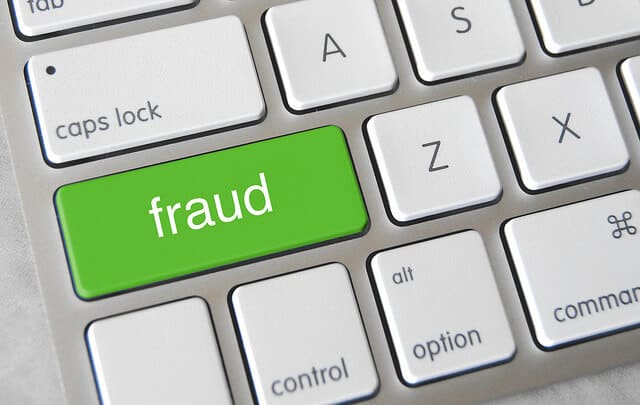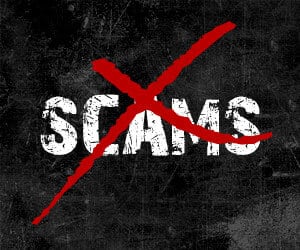Watch out for Fake High School Diplomas & Fake Online Schools

Find exactly what you're looking for by skipping to the section you're interested in.
Page Navigation
Fake Online High Schools
For many high school students, the idea of an online high school sounds like a tantalizing alternative to the traditional U.S. brick-and-mortar schools.
Freedom, flexibility, and personalization! Although there are many pros and cons to attending high school online, one of the biggest “cons” is not something you might initially expect.
Lack of student interaction? Difficulty learning without a “real” teacher?
Nope.
The biggest danger when considering earning a high school degree online is falling for a fake online high school.
What is a Fake Online High School?

Fake online high schools are internet scams that claim to offer accredited high school diplomas that have no accreditation or value.
An online high school is deemed fraudulent if it does not hold State of US Department of Education recognized accreditation. These fake schools do not meet the State requirements for issuing a high school diploma, and therefore violate State and Federal Laws.
If you “attend” a school that is not accredited, you will probably end up with a diploma that isn't even worth the paper it’s written on.
High School Diploma Mills
Diploma mills issues thousands of fake high school diplomas. Unlike some online high schools, they won’t even try to convince you that you’ll learn anything. Diploma mills exist solely to make money. They do not to provide an education.
In the past, the FTC has sued diploma mills for profiting millions of dollars. Click here for the most recently updated list of high school diploma scams.
How to Identify a Fake Online School or Diploma
 There are many warning signs to look out for when searching for a school that'll get you the diploma you need for graduation, a job, college, and beyond.
There are many warning signs to look out for when searching for a school that'll get you the diploma you need for graduation, a job, college, and beyond.
We’re going to cover common warning signs, how to check for accreditation, and how to identify a fake diploma. Then we’ll cover the difference between a diploma and accreditation.
Warning Signs and Red Flags
You're probably familiar with the saying, “if it’s too good to be true, it probably is.” Well, this case is no different.
The internet is full of scams, and education happens to be extremely profitable. Nowadays all scammers need is a great looking website and some convincing text. Paying for things online is easier than ever, which also makes it more dangerous.
Here is a list of some common red flags:
- Location – does the school have an official address? It's worth looking on Google to see if the school has an official office or brick-and-mortar location listed.
- Contact details – the website should provide you with some way to easily contact the school. Be suspicious if all they have is a basic contact form. There should always be a telephone and staff details.
- No staff details – big red flag. There may even be legitimate schools that don’t list staff. This is a bad sign on all accounts because you will want a program with good support. Imagine being stuck on something and being unable to conveniently contact a teacher/support. This should always be a fundamental aspect of an online school’s services.
- School name – many scammers like to name their schools (or companies) something that sounds like a trusted brand. Just because the school sounds official does not mean you’re in the clear to hand over any money.
- Flat-rate tuition – almost all schools/colleges charge by class or credits, so be wary if you're being offered a diploma for one lump sum.
- Fake testimonials – as a rule of thumb, never trust a testimonial that is hosted only on the website address (domain) it’s giving a testimonial about. Any website can write anything they want and publish it on their own domain. Look for reviews on 3rd party websites that the high school cannot control.
Recognizing a Fake High School Diploma

Diploma mills run ads that often include the following characteristics and features:
- Degree completion only takes months or days
- They claim they can offer a degree for your “life experience”
- One flat fee for a degree
- No interaction with teachers is required
- Little or no course work is required
Don’t be fooled by fee's
As a rule, the more expensive something is the more valuable it is. So, it's not unreasonable to think that an expensive school must have some level of prestige. Surely expense translates into “genuine” and will look great to colleges or future employers once you receive it.
This is sadly another trick often used by fake online schools to attract new students to their courses. It's good practice to shop around because it gives you an idea of what something 'should' cost.
So, have a look at the prices offered by different schools, even ones you have no intention of studying with as it will help you to spot anything that seems out of the ordinary.
What does a fake diploma look like?
You may think a fake diploma would look 'fake,' but this is not the case. Many diplomas issued by fake online high schools can look very convincing. If you’re curious, look at this site: phonydiploma.com. They issue fake diplomas and other certificates as gimmicks but, as you can see, they look very real indeed.
How to Tell if an Online High School Diploma is Legitimate
A great place to start would be to search the International Registry for Accreditation’s AdvanceED database.
Check for the school on your regional accrediting agencies.
- Middle States Association of Colleges and Schools Commissions on Elementary and Secondary Schools (MSA-CESS)
- New England Association of Schools and Colleges (NEASC)
- Northwest Accreditation Commission (NWAC)
- North Central Association Commission on Accreditation and School Improvement (NCA-CASI)
- Southern Association of Colleges & Schools Council on Accreditation and School Improvement (SACS CASI)
- Western Association of Schools and Colleges (WASC)
As an additional safety measure, search for the institution’s name on the Better Business Bureau’s website and RipOffReport.
Many smart high school students will dual enroll in community college classes or early college classes. Many online colleges are fraudulent. For colleges, check the US Department of Education's Database of Accredited Postsecondary Institutions and Programs.
If anything, this is a great exercise in quality assurance as every institution listed in the database must meet the required standards of education.
There is No Online GED® Test
The GED® Test is never available online. Period.
If you plan to earn your GED®, use their website to find official testing centers and schedule your test.
Any online high school that suggests or implies they can grant you an online GED in place of issuing a diploma is a scam.
What is the difference between a diploma and accreditation?
High school accreditation is a type of quality assurance process. A 3rd party will evaluate the school’s services and operations to determine if the school meets bare minimum requirements. When the standards are met, the school is given an “accredited status.” The accreditation will be issued by a regional “accreditation agency.”
A diploma is the piece of paper the high school (or other educational institution) gives you as proof of your graduation. When you complete high school, you will be issued a diploma. That diploma will have accreditation, meaning it meets the academic standards outlined by the educational body that is accrediting it.
So, if the school is 'fake,' you'll still receive a diploma for the course you took, however, it probably won't be accredited meaning it has no value as there is no proof that the quality of the course meets the required academic standards.
As a side note, the perceived value of a diploma will often depend on both the accrediting agency and the type of courses undertaken.







I'm a out of school youth here in Philippines and I want to finish my High school but I don't have money to continue my studies
I'm frustrated person now
thanks for sharing valueble informationpest control